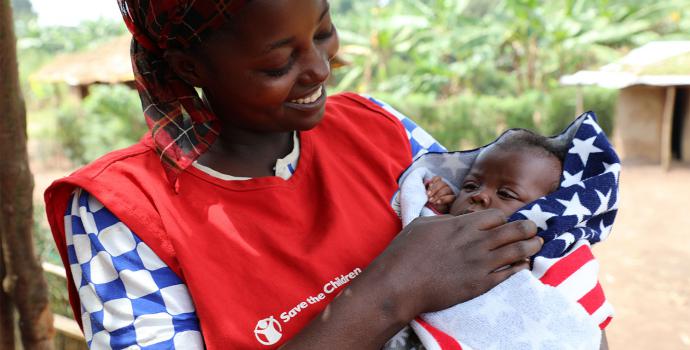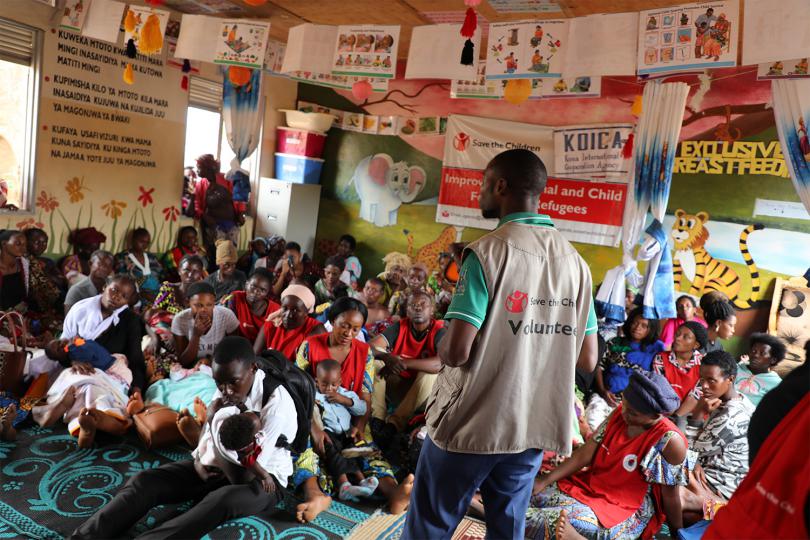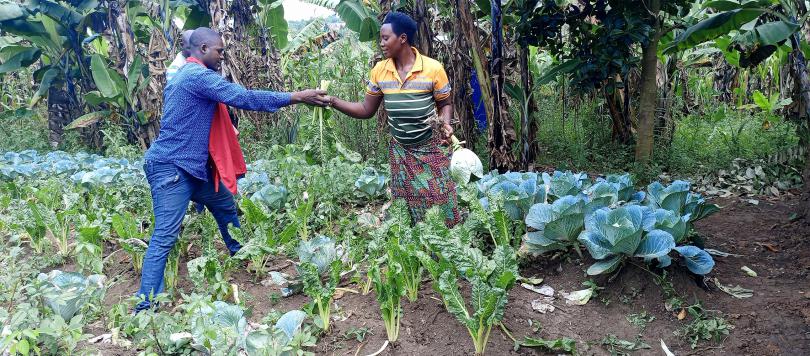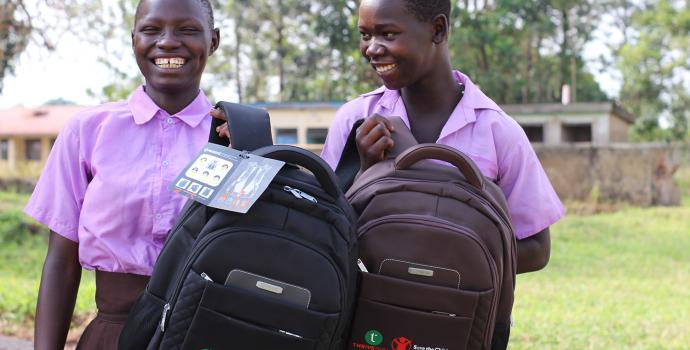SAVE THE CHILDREN, KOICA SUPPORT INFANT AND YOUNG CHILD FEEDING

The Uganda 2022 Food Security and Nutrition Assessment (FSNA) survey in Refugee settlements has unveiled a worrying surge in stunting and anemia among children under five. In some settlements, the severity of the situation has led to their classification as critical by the World Health Organization (WHO).
Responding to this alarming scenario, Save the Children has proactively taken steps to address malnutrition and create a meaningful impact on the lives of vulnerable communities. Their efforts are focused on reducing stunting among children under five in two heavily burdened refugee settlements and two refugee transit centers: Kyaka and Kyangwali refugee settlements, as well as Matanda and Nyakabande transit centers. This initiative stands as an inspiring model of community support in the face of displacement and resource limitations.
Their two-and-a-half-year nutrition project, named "Provision of gender-responsive and age-appropriate Infant and Young Child Feeding (IYCF) for refugee and host pregnant lactating women and children under 2," funded by the Korea International Cooperation Agency, Humanitarian Partnership Program (KOICA HPP). The primary aim of this project is to align with the Government of Uganda's ambitious vision of eradicating malnutrition, working towards a future free from this challenge. The project strives to achieve its goals by enhancing the understanding, attitudes, and practices related to IYCF among caregivers of children while also ensuring improved accessibility to IYCF services for Pregnant and Lactating Women (PLW).
The efforts of Save the Children have yielded promising results, with the Global Acute Malnutrition (GAM) rates decreasing from 1.2% to 0.7% and from 1.1% to 1.4% in Kyaka II and Kyangwali, respectively (FSNA 2022). Although there was a slight increase in GAM in Kyangwali compared to 2020, overall, the rates remain low.
However, the prevalence of stunting, though slightly reduced from 49% to 48% in Kyangwali, it remains alarmingly high. The project has achieved a more significant reduction from 48.7% to 42% in Kyaka 2, indicating progress in addressing stunting.
Despite the notable reduction in Global Acute Malnutrition (GAM), there remains a significant challenge with anemia, affecting 57% and 26% of children aged 6-59 months in Kyangwali and Kyaka II refugee settlements, respectively.
In response, Save the Children's nutrition project responded by empowering caregivers to drive positive social and behavioral changes in infant and young child feeding practices. These efforts raise awareness, acceptance, and support for IYCF practices alongside promoting nutritious food production and household food security.
Central to this initiative is the focus on the most vulnerable: children and families. It employs two strategies - Nourishing the Youngest and Resourcing Families for Better Nutrition - ensuring a healthier future for all.
A key aspect is establishing mother-baby areas (MBAs) in strategic settlement locations. These provide education and mutual support on maternal and child feeding. Caregivers offer essential tools through group and individual counseling for optimal child care.
The project formed six care groups led by 90 dedicated volunteers, trained extensively in maternal and child nutrition, caregiving, agronomic practices, and financial literacy. Their knowledge spreads, empowering neighboring women and men, creating a positive chain reaction.
Recognizing food security's significance, the project equips care groups with small animals and garden seeds. This enhances livelihoods and household food security, easing challenges faced by struggling families.
Beyond immediate needs, the project instills hope and resilience, nurturing environments for children and communities to thrive.

Save the Children volunteer talking to mothers in a baby mother area.
Peter and Jessica’s Change Story
Arriving at Kyaka II settlement camp in 2016 after fleeing the turmoil in the Democratic Republic of Congo, Peter and his wife Jessica faced tough challenges. "Being new here, we had no access to food due to lack of income," Peter said.
After setbacks, including a failed piggery business, they struggled without nutritious food or income. Fortunately, Save the Children's KOICA HPP project in 2021 turned things around.
Empowering Working Women through MIYCAN:
The MIYCAN initiative has played a vital role in the transformational journey of breastfeeding mothers.
Empowered by MIYCAN, Jessica transformed. "Before, I was unaware of hygiene, and proper nutrition. I was also ignorant about the three classes of food children required in their diet and breastfeeding," she admitted.
However, with mentorship from the project's Mother-Baby Area (MBAs) program, she she gained vital knowledge and skills, becoming both a beneficiary and a lead caregiver.
"I learned about breastfeeding and identifying problems," Jessica said. She shared this knowledge, making other mothers and babies healthier.
She mentored moms facing diet challenges: "I taught them to express milk when busy or find time amidst chores."
Now, Kyaka II mothers exclusively breastfeed, credited to Save the Children and KOICA support.
Peter, influenced by MBA training, better supports Jessica and their child. "I feel more responsible," he shared. He noted women learned timely feeding, strengthening bonds.
In a challenging situation, Peter and Jessica's journey stands as a testament to positive change through community support.
Transforming Lives through Livelihoods:
Through care group training, Peter embraced sustainable agriculture, cultivating cabbages, green peppers, and tomatoes. He sells these crops, improving his family's home and venturing into animal husbandry.
"I now grow cabbages, green pepper, and tomatoes, which I sell. I have been able to build a better house through my agricultural sales, as well as venture into animal husbandry," he explained.
His dedication led to weekly savings of Ush25,000 after market days. He aspires to use these savings to expand his transportation and thriving agro business with a motorbike.
Overall Impact:
"There has been a notable increase in men's engagement in supporting their wives with house chores and breastfeeding, leading to a commendable reduction in cases of domestic violence," said Fiona Onya, the Monitoring, Evaluation, Accountability, and Learning (MEAL) Officer with Save the Children.
Furthermore, there is growing awareness among the people about the benefits of breastfeeding. This awareness spans from promoting early initiation of breastfeeding to advocating for exclusive breastfeeding for up to six months, followed by the introduction of complementary feeding to ensure a diverse and nutritious diet for children. These positive developments signal a promising shift towards healthier family dynamics and improved child well-being.
Overcoming Challenges:
Leo Assimwe Mugabi, Assistant Commandant of Kyaka II settlement, noted smooth KOICA initiative implementation yet voiced concern over potential funding gaps. He urged more partners to fund programs and stressed the need for sustainability planning to prolong impact even after their involvement ends.
Mugabi emphasizes long-term solutions during planning to ensure lasting positive change.
Lee Seunguik, KOICA Advisor, highlighted project sustainability through health worker training and joint monitoring. Save the Children and KOICA, with community and government collaboration, will establish strategies to preserve achievements.
Empowerment and education transformed individuals like Peter and Jessica into family pillars and community leaders. Their initiatives underscore the positive outcomes achievable when communities are supported on their journey.





